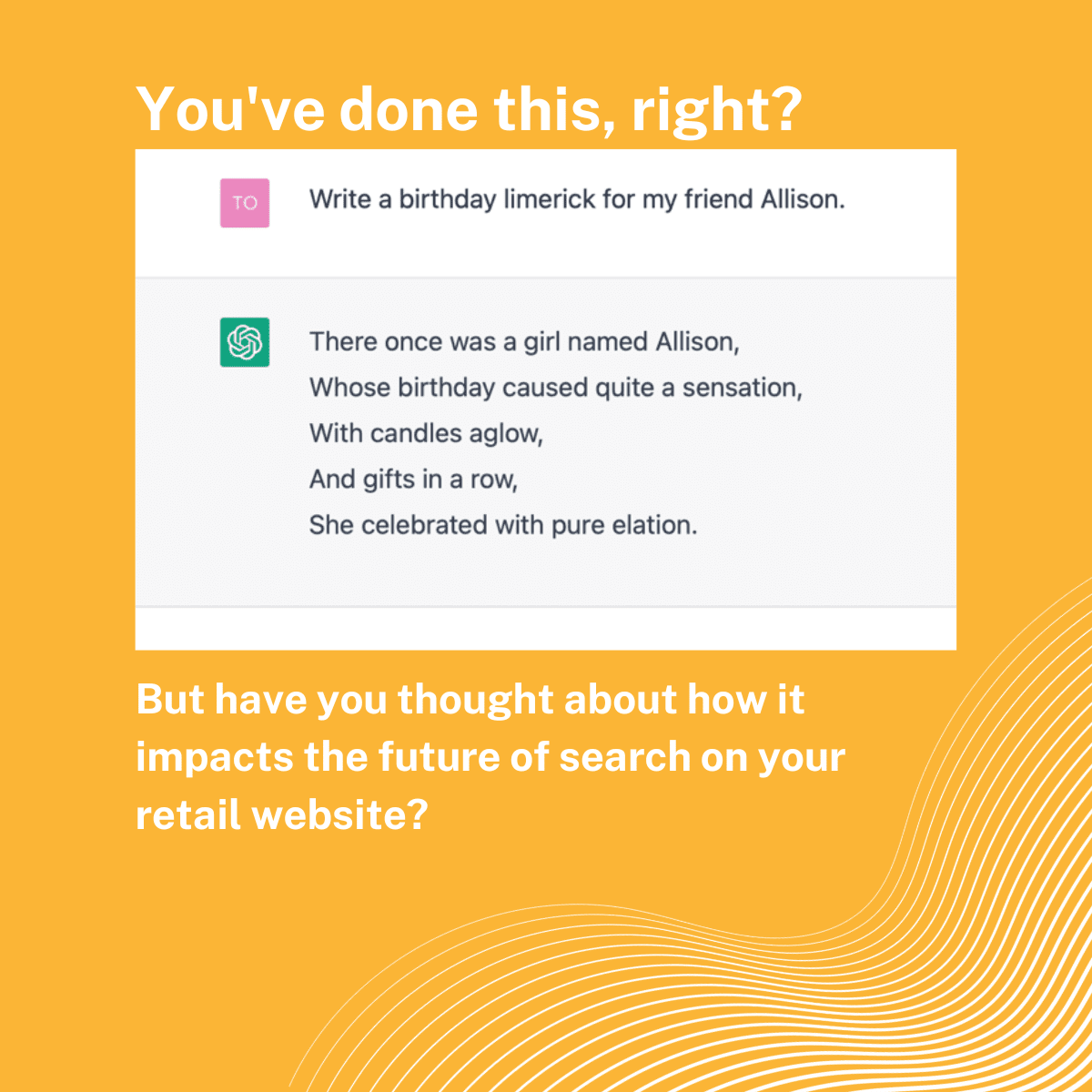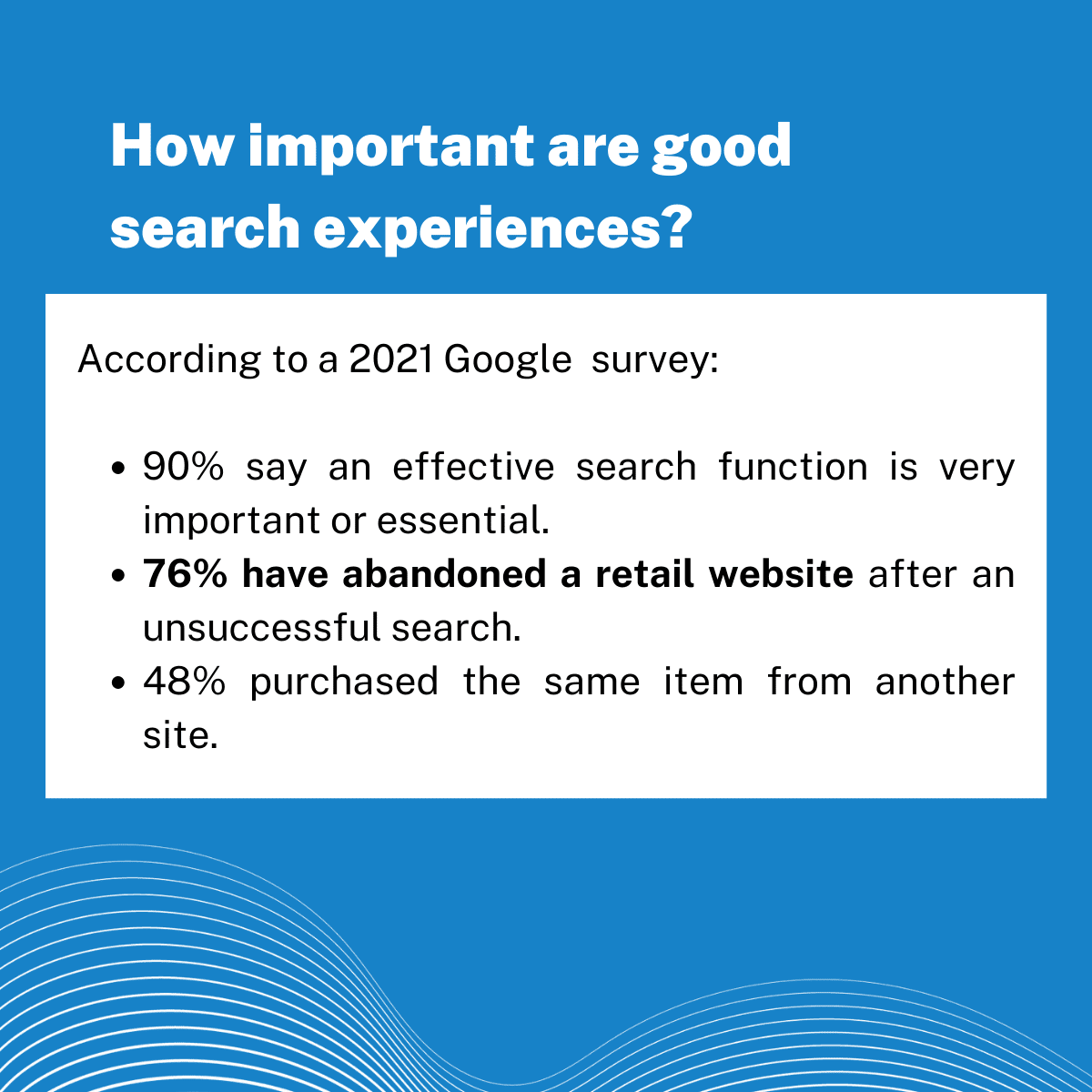What Do Search Abandonment and ChatGPT Have in Common?
We dive into how brands can stay ahead of changing expectations in an ever-evolving, AI-powered world.

What was the first question you ever asked ChatGPT? And how much time have you spent since then typing in random questions—and being amused (or amazed) at the responses you get back? In a few short months, the ChatGPT phenomenon has taken the world by storm, mainly because it has suddenly made the power and possibility of AI uniquely accessible, useful, and relevant to anyone with a smartphone.
There have been plenty of spirited conversations about the impact of ChatGPT (and other advances in generative AI) on content creators, coders, educators, and other professionals. But for online retailers, the implications are perhaps less about how well AI bots can perform traditionally human tasks (like composing hilarious birthday limericks)—and more about how these technologies are shifting people’s habits and expectations every time they interact with your brand.

Remember those Boolean operators?
For example, just a few short years ago online shoppers were perfectly happy to type a few keywords (along with some strategically placed Booleans) into a search bar, wait for the results, and then try different words or variations until they found what they were looking for. “No results” searches were common and accepted. The mindset was that if your initial search failed, it was because you weren’t using quite the right combination of keywords or search terms, so you kept on trying.
Not anymore. According to a 2021 Google Cloud survey, nine in ten consumers say an effective search function is either very important or absolutely essential, and it’s by far the most common tool people use on retail websites to find what they’re looking for. 76% of those consumers claim that an unsuccessful search has caused them to actually abandon a retail website. 48% say they then purchased the same item from another site. And more than half claim that they often ditch their entire shopping cart if they have trouble finding just one item on their list.

ChatGPT: raising consumers’ expectations since… a few months ago
And of course, that was all true before ChatGPT stormed onto the scene in late 2022, which has shifted and raised consumers’ expectations yet again. Today, shoppers feel like they should be able to describe what they’re looking for in their own words as if they were talking to a live representative. They expect the search function to understand the intent of their query, know their personal preferences, provide alternate options and suggestions, and even ask follow-up questions. If ChatGPT can spontaneously compose a college-level essay on string theory, the thinking goes, why can’t their favorite home improvement store’s search function point them to the perfect shelving option for their next project—no matter how they describe it? And most important, in this increasingly AI-infused world, “no results” basically means “game over.”
You can’t afford bad search experiences
The numbers paint a compelling picture of what’s at stake. In the U.S. alone, retailers lose around $300 billion in revenue every year due to bad online search experiences, and 85% of global online consumers say they view a brand differently after they’ve had a poor search experience. On the flip side, 69% of consumers say that successful searches often lead to the purchase of additional items, and nearly all of them (99%) say they are somewhat or very likely to return to a website with strong search capabilities.
Bad search experiences cost U.S. retailers $300 billion every year.
Jumping ahead of the search curve
Given the undeniable importance of your website’s search function and the incredibly negative impact poor search experiences and search abandonment can have on your reputation and bottom line, how do you stay ahead of the search curve? And how do you deliver the kinds of smart, personalized, and intent-driven search experiences your customers expect in their AI-powered world?
Let’s talk semantics
The best approach involves combining multiple tools, techniques, and technologies that are all grounded in semantic vector search— also known as dense vector search. This is a methodology that leverages deep learning models to perform searches based on meaning and intent, rather than simply matching words in a query with words in product names and catalog descriptions.
It’s a complex and highly technical topic, but semantic vector search is the key to creating more personalized, relevant, and dynamic search experiences—and eliminating the “no results” searches that drive customers away from your website. Semantic vector search draws from and incorporates a range of different techniques and technologies. Here’s a partial list:
- Knowledge graphs establish and map crucial connections and relationships between loosely related concepts, topics, and products. Knowledge graphs make it possible to create search experiences that open customers’ eyes to new possibilities and opportunities they hadn’t even thought of every time they perform a search.
- Large language modeling enables the essential shift from “enter a few keywords and hope for the best” to “just tell me what you’re looking for in your own words.” It’s a key component in tools like ChatGPT, and it’s an increasingly essential piece of any modern search experience.
Prompt engineering turns searches into natural language conversations that help guide people to products they’re looking for—even when they’re obscure or difficult to find. - Visual searching allows customers to search using images, rather than words. Like when you carry an odd-shaped bolt into the hardware store and say, “I need one of these,” visual searching can transform how people search for obscure or difficult to describe items.
- Hybrid search, which allows for flexible and strategic application of the best search strategy to apply in a given context (be it semantic, lexical, or conversational).
Create your own ChatGPT-level search experiences
Building an advanced, AI-powered search solution that incorporates all these capabilities (and others) certainly isn’t easy. Fortunately, Lucidworks is ready to help. We know exactly what it takes, and we have the technology and expertise to help you build smart, future-proof search experiences that rival the most advanced and successful retail organizations in the world. Find out how Lucidworks can help you harness the power of AI to create search experiences that exceed your customers’ rising expectations—and put a permanent end to costly and damaging search abandonment.
Interested in how Lucidworks solutions can take your search experience to the next level? Get in touch with us today.
LEARN MORE
Contact us today to learn how Lucidworks can help your team create powerful search and discovery applications for your customers and employees.